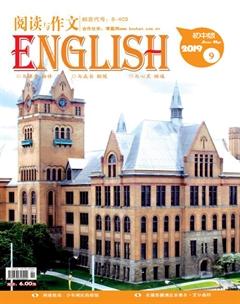病房里的婚礼
There wasnt going to be a happy ending. The patient had metastatic[转移性的] cancer and had just gone through her third unsuccessful regimen[疗程] of chemotherapy[化疗]. Now it seemed that everywhere we looked, we found disease.
When she arrived in the intensive care unit[重症监护病房], she was delirious[神智昏迷的]. I asked her the usual questions, about her medical history, and whether she wanted us to do CPR注1 if her heart were to stop beating, but she didnt answer. I was just setting the clipboard[带夹子的写字板] aside when she raised a hand and told me: “Doc, do everything you can. I need to make it to my daughters wedding.”
She was in a lot of pain. She had a tube down her nose draining[引流] her stomach.
“When is the wedding?” I asked.
“Next summer.”
I blinked[眨眼]. I blinked again. She didnt—she was looking right at me. At this point, I doubted shed make it through the hospitalization[住院治疗], let alone eight more months. I didnt know what I could say. I put the stethoscope[听诊器] against her chest and fell into silence.
I met Stefanie, her daughter, the next morning. She was 24, but was only eight when her mothers cancer was first diagnosed[诊断]. Stefanie had shared her home with cancer for many years, and had always seen her mother fight.
But she knew that this time was different. The oncology[肿瘤学] fellow who had been treating her mother as an outpatient[门诊病人] was the one to tell her that her mother was dying. Stefanie broke down, but understood there was no use denying[否认] it. The dream of a family wedding under the summer sun turned sour[令人失望,变坏].
Stefanie called her fiance[未婚夫] that morning. Crying, she told him the news. But he turned things completely around. Without hesitation[犹豫] he told her, “I want her to be there, too,” and he promised not only to have the wedding done sooner, but to have it done right there in the ICU.
Our medical team was used to dealing with all kinds of crises[危機]: Handling a last-minute wedding was not one of them. While having more than one opinion on a medical team regarding[关于] how best to manage a patient is fairly routine[日常的], we received no push back from anyone as we started to make arrangements for[安排某事] the wedding. Soon the whole team was involved. We sent a letter to the court[法院] to speed up the marriage certificate[结婚证]. A pastor[牧师] and harp[竖琴] player were booked. The hospital cafeteria[自助餐厅] baked a chocolate cake, and the nurses brought in flowers. In just a few days, we were ready.
My job was to make sure our patients pain was controlled while also avoiding the confusion[混乱状态] that is a side effect[副作用] of narcotic[麻醉] medications. But miraculously[奇迹般地], she didnt need pain medications for hours and was fully aware of everything that was going on. Looking at the bride[新娘] and groom[新郎] from her hospital bed, she seemed more comfortable than I had ever seen her before. The whole day had an unreal feel to it; everything felt like it slowed down. The sun shone through the windows and glistened[闪耀] on the bags of fluid[液体]. For once in the hospital, there were tears but no pain. It felt as if, after all these years of chasing our patient down, even the cancer took a break.
The next morning, the family decided to move her to hospice. No intubation[插管], no CPR—nothing that would prolong[延长] life. It was all about trying to make the patient comfortable. (And yet, four months later, she is still alive.)
In todays efficiency[效率]obsessed[着迷] medical world, its easy to forget that healing patients isnt just about treating diseases and relieving[减轻] symptoms[症状]. There are things doctors and nurses can do, meaningful interventions[干涉]—like helping patients fulfill final goals or spend quality time注2 with their families—that cannot be documented[记录] in a discharge summary[出院小结] or be converted[转变] into a blip[评论] on a screen.
As a doctor, I never liked the word “miracle.”I preferred to think in terms of[以……措辞] “medical outliers[异常值].” And yet that day of the wedding did feel like a miracle. Doctors often share their patients sorrow[悲伤], but rarely their joys. We had not discovered the cure to cancer, but we had achieved something powerful—freeing, if only temporarily[短暂地], our patient from her disease.
One of the nurses, smiling through her tears, spoke to me after it was all over. “It was magical,”she said. “None of the patient alarms went off.”
在这里不会出现幸福的大团圆结局。那个病人的癌细胞已经转移扩散,而且剛做完的第三次化疗效果也很不理想。现在,我们发现她似乎浑身上下都是病。
刚转到重症监护病房(ICU)的时候,她已经神志不清了。我问了一些关于她病史的常规问题。我还问她如果她的心脏骤停,是否希望我们为她做心肺复苏术,但她不予回答。正当我要把写字板放到一边的时候,她举起一只手,对我说:“医生,请您尽一切努力帮我。我要参加我女儿的婚礼。”
她忍受着巨大的痛苦——她的鼻子下插着一根直接通到胃部的引流管。
“婚礼什么时候举行?”我问道。
“明年夏天。”
我眨了下眼睛,再眨了一次。她没眨眼——正定定地看着我。在这一刻,我怀疑她能否挺过这次住院治疗,更别提撑到八个月以后了。我不知道该说什么好,于是我把听诊器放在她的胸膛上,然后陷入了沉默。
第二天早晨我见到了斯蒂芬妮,她的女儿。她今年24岁,八岁那年,她妈妈第一次被确诊患上癌症。多年来,癌症的阴影笼罩着这个家。斯蒂芬妮总在一旁看着母亲与病魔作斗争。
但她知道这次不一样。为她母亲做门诊治疗的医生告诉她,她母亲将不久于人世。斯蒂芬妮几近崩溃,但她知道否认毫无意义。在夏日阳光下举办家庭婚礼的梦想一下子被击得粉碎。
那天早上,斯蒂芬妮给她的未婚夫打电话,哭着告诉他这个噩耗。但他完全扭转了局面。他毫不犹豫地对斯蒂芬妮说:“我希望她也能参加我们的婚礼。”他承诺婚礼不但会尽快举行,而且还要在重症监护病房里举办。
我们的医疗团队处理过各种各样的紧急事件,但让一个生命垂危的人参加婚礼并不在其中。对于如何为病人提供最佳治疗方案,一个医疗团队常常会有不同的意见,但我们从筹备婚礼开始却没有受到任何阻力。没过多久,整个团队都参与了进来。我们给法院寄了一封信,催促他们尽快办好结婚证。牧师和竖琴演奏家也都预约好了。医院的自助餐厅烤了一个巧克力蛋糕,护士们带来了鲜花。只用了几天,一切就准备就绪。
我的工作是确保我们的病人疼痛得到缓解,同时还要避免由麻醉药物带来的副作用——精神错乱。但奇迹般地,她在几个小时里没有服用任何止痛药,而且在整个婚礼过程中都保持着绝对清醒。看着病床边的新郎新娘,她似乎比以往任何时候都惬意。这一天让人感觉很不真实,仿佛世间一切都放慢了脚步。阳光透过窗户照射进来,在输液袋上迸发出璀璨的光芒。这是第一次,医院里流淌着的泪水没有痛苦。似乎这么多年来一直追着病人跑的癌症,也停下了脚步。
第二天早上,她的家人决定把她转到临终关怀医院。没有插管,没有心肺复苏术——没有任何延长生命的医疗手段。那里的一切都是为了让病人活得舒服些。(然而四个月后,她依然活着。)
在今天这个讲求效率的医疗世界,我们很容易就忘了治病不仅仅是治好疾病和缓解症状。医护人员还可以做其他一些事,采取一些有意义的干预措施——比如帮助病人实现最终目标,或者让病人与家人一起共享天伦之乐——虽然这些措施都不会被记录在出院小结上,也不会转变成屏幕上的信息。
作为一名医生,我一向不喜欢“奇迹”这个词。我更愿意称之为“医疗异常值”。然而那天的婚礼的确像是一个奇迹。医生经常分担病人的苦痛,却甚少分享他们的快乐。虽然我们还没发现治愈癌症的方法,但我们已经得到了一种强有力的东西——让我们的病人从疾病的痛苦中解脱出来,哪怕只是片刻。
婚礼结束后,其中一位护士笑中带泪地对我说:“这真是太神奇了,(婚礼期间)没有任何一个病人的呼叫器被按响。”
- 阅读与作文(英语初中版)的其它文章
- 四季
- “中国制造”的新含义
- 《荆棘鸟》
- 成语两则
- 奇闻趣事
- 网络欺凌:少年网民的烦恼

